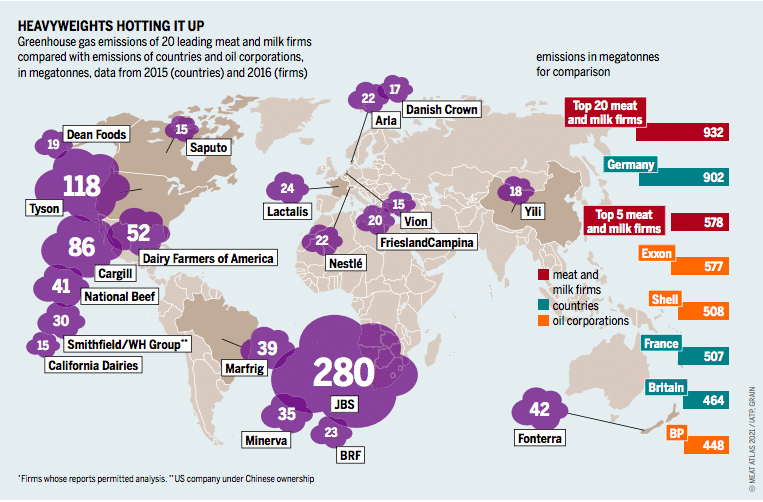A new report finds a small number of leading meat and milk producers emit more greenhouse gasses than Germany, Britain or France while global meat consumption continues to rise.
—
Twenty livestock and dairy companies emit a greater volume of greenhouse gasses than countries like Germany, Britain or France, according to a damning report by Friends of the Earth and the European political foundation, Heinrich Böll Stiftung.
Meat Atlas is a study of the meat industry, and found that not only do livestock corporations fuel the climate crisis, contribute towards biodiversity loss and responsible deforestation to make way for livestock production and ranching, but these companies are being financed by the world’s most powerful banks and investors.
Between 2015 and 2020, global meat and dairy producers and companies received more than USD$478 billion from 2,500 investment firms, banks, and pension funds, most of which are based in North America or Europe.
The industry contributes 56-58% of the greenhouse gas emissions for the food sector from raising livestock, despite only supporting only 37% of the protein supply for the world’s population. To put this in context, the food sector accounts for 21-37% of global greenhouse gas emissions, according to the recent IPCC report.
The report also reveals that the combined greenhouse gas emissions of only five meat and milk producers – JBS, Tyson, Cargill, Dairy Farmers of America und Fonterra, produce more greenhouse gases per year than oil giants like Exxon, Shell or BP.

Image 1: Comparing greenhouse gas emissions of 20 leading meat and milk producers with oil companies and countries. Photo by: Meat Atlas 2021/OECD, FAO.
You might also like: It’s Time For Big Meat to Take Accountability For its Environmental Impact
Global demands and consumption of meat continue to rise due to economic prosperity and population growth, and have more than doubled over the last 20 years, reaching up to 320 million tonnes in 2018. While China is the world’s biggest meat consumer, devouring almost one-third of the world’s meat, the biggest growth in meat consumption is shifting towards developing countries. It is currently on track to rise by four times as much as in the developed world by 2028.
Humans are also consuming more poultry while eating less beef and lamb. The per capita poultry consumption in the US has more than doubled within the past 30 years whereas beef has dropped by about a third. This could be linked to factors such as poultry having a lower fat content and prices.
The biggest meat and livestock producers will continue to be China, the US, Brazil, and the EU, exporting as much as 60% of worldwide meat output.
Other harmful impacts of the livestock and meat industry highlighted in the report include deforestation and meat waste. Three-quarters of all agricultural land across the world is being used to raise animals or the crops to feed them. In South America, “natural vegetation is being turned into pastureland and monocultures to support an unsustainable form of livestock production,” while industrialised agriculture has become more common in Africa and Asia.
The report stresses how COVID-19 should have rung alarm bells for the world, considering how closely linked industrial agriculture and meat productions are with global human health. However, governments have yet to establish any strategies to reduce meat consumption as a tool to mitigate climate change, as well as regulating meat and livestock companies to minimise damage across the supply chain.


















